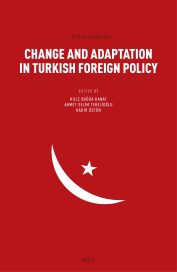Change and Adaptation in Turkish Foreign Policy

Turkish foreign policy has, for a variety of reasons, been the center of attention for scholars and analysts over the past several years. Turkey has emerged as a regional powerhouse with enviable economic growth and democratic development, propelling its foreign policy initiatives. In fact, very few countries have received as much attention in recent years as Turkey. The SETA Foundation at Washington D.C has strived to contribute to dialogues on Turkish foreign policy through a variety of innovative programs, such as the Young Scholars on Turkey (YSOT) program. citrus college wingspan . As a component of the YSOT program, SETA organized an international conference on February 5, 2013. This volume draws on articles submitted by scholars who presented their work to the Washington audience therein.
The YSOT program was designed to serve as a bridge between academic research and policy debates on Turkey, and to contribute to discussions, specifically in the Washington DC policy community, by drawing on already accumulated academic knowledge. Early career scholars’ new research and fresh perspectives have rendered this program unique in many ways. As “young” scholars find it an opportunity as well as a challenge to present their work to the policy community, policy “analysts” find it truly enriching to hear from scholars visiting from around the globe. For us at SETA, it is both a challenging and rewarding experience to bring these two communities together, particularly to discuss Turkish foreign policy. We believe in the value of this endeavor and aim to continue this program in the future.
The first YSOT conference in April 2011 resulted in a volume titled History, Politics, and Foreign Policy in Turkey, edited by Kilic Bugra Kanat, Nuh Yilmaz, and Kadir Ustun and published by the SETA Foundation. We have once again opted to work on an edited volume, rather than publish the proceedings of the 2013 YSOT conference.
The current volume is organized into two parts. The first part – “Turkish Foreign Policy and US-Turkey Relations” – begins with an introductory chapter titled , “Theorizing the Transformation of Turkish Foreign Policy.” Within, Kilic Bugra Kanat presents a thoughtful consideration of the structural changes in Turkish foreign policymaking over the past decade, those which are often missed in Turkish foreign policy debates. Kanat carefully considers the relationship between the end of an international system and its impact on Turkey’s foreign policy decisions. By examining the discussions from the perspective of the global international system and post-Cold War US foreign policy, the chapter situates Turkey’s emergence as a regional actor within a broader context that addresses the relationships between a great power – such as the US – and a regional power – such as Turkey – in a unipolar world. On the domestic front, Kanat identifies significant yet under-discussed transformations. By drawing attention to the increased importance of public opinion and changes in decision-making mechanisms in Turkey, Kanat outlines the domestic dynamics of Turkish foreign policy change. He goes further than simply asserting that many scholars still hold onto Cold War understanding of Turkish foreign policy by identifying specific trends that have propelled the major transformations we have witnessed over the past decade.
The second part of this volume is titled, “Turkish Foreign Policy in the Middle East,” a topic that has been one of the focal points for academics and analysts in the wake of the Arab Spring. Since January 2011, the Middle East has experienced momentous changes with which even the most adaptable and dynamic countries have found it very difficult to keep up. As Turkish foreign policy has identified this period as a historic moment, it has responded to developments in every country that has been influenced by the regional structural changes the Arab Spring has engendered.
In the wake of historic turmoil in the region, Turkey’s foreign policy will continue to be closely followed, especially if the country is able to sustain its economic growth, political stability, and diplomatic activism. Some irreversible and structural changes have already occurred, while some are discussed at length in this volume. These chapters provide us with a strong sense of Turkish foreign policy areas that may adjust in light of residual regional uncertainties and developing conflicts, while also presenting a unique perspective that places emphasis on the impact of regional crises and global transformations. Turkey’s ability to respond to forces that affect its policies will define the limits and the extent of Turkey’s role, both in the Middle East and globally. As such, this volume aims to offer a significant contribution to debates on change and adaptation in Turkish foreign policy.
Get a hardcopy or Kindle edition at Amazon.com.




















